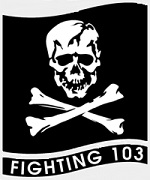Hobby Master HA5139 US Navy Boeing F/A-18F Super Hornet Strike Fighter - AG203/166613, VFA-103 "Jolly Rogers", NAS Oceana, Virginia, June 2016 [Low-Vis Scheme] (1:72 Scale)
"...train fighter air crews at the graduate level in all aspects of fighter weapons systems including tactics, techniques, procedures and doctrine. It serves to build a nucleus of eminently knowledgeable fighter crews to construct, guide, and enhance weapons training cycles and subsequent aircrew performance. This select group acts as the F-4 community's most operationally orientated weapons specialists. TOPGUN's efforts are dedicated to the Navy's professional fighter crews, past, present and future."
- 1973 command history of the Navy Fighter Weapons School
 The Boeing F/A-18E and F/A-18F Super Hornet are twin-engine carrier-capable multirole fighter aircraft variants based on the McDonnell Douglas F/A-18 Hornet. The F/A-18E single-seat and F/A-18F tandem-seat variants are larger and more advanced derivatives of the F/A-18C and D Hornet. The Super Hornet has an internal 20 mm M61 rotary cannon and can carry air-to-air missiles and air-to-surface weapons. Additional fuel can be carried in up to five external fuel tanks and the aircraft can be configured as an airborne tanker by adding an external air refueling system.
The Boeing F/A-18E and F/A-18F Super Hornet are twin-engine carrier-capable multirole fighter aircraft variants based on the McDonnell Douglas F/A-18 Hornet. The F/A-18E single-seat and F/A-18F tandem-seat variants are larger and more advanced derivatives of the F/A-18C and D Hornet. The Super Hornet has an internal 20 mm M61 rotary cannon and can carry air-to-air missiles and air-to-surface weapons. Additional fuel can be carried in up to five external fuel tanks and the aircraft can be configured as an airborne tanker by adding an external air refueling system.
Designed and initially produced by McDonnell Douglas, the Super Hornet first flew in 1995. Full-rate production began in September 1997, after the merger of McDonnell Douglas and Boeing the previous month. The Super Hornet entered service with the United States Navy in 1999, replacing the Grumman F-14 Tomcat, which was retired in 2006; the Super Hornet serves alongside the original Hornet. The Royal Australian Air Force (RAAF), which has operated the F/A-18A as its main fighter since 1984, ordered the F/A-18F in 2007 to replace its aging F-111C fleet. RAAF Super Hornets entered service in December 2010.
Pictured here is a gorgeous 1:72 scale diecast replica of a United States Navy F/A-18E Super Hornet that was attached to VFA-103 "Jolly Rogers", then deployed to NAS Oceana, Virginia, during June 2016.
Back Order! Return to stock date February 2025
Dimensions:
Wingspan: 7-1/2-inches
Length: 9-inches
Release Date: November 2024
 Historical Account: "Jolly Rogers" - Strike Fighter Squadron 103 (VFA-103), nicknamed the Jolly Rogers is an aviation unit of the United States Navy established in 1952. VFA-103 flies the F/A-18F Super Hornet and is based at Naval Air Station Oceana, Virginia (USA). The squadron's radio call sign is Victory and it is assigned to Carrier Air Wing Seven.
Historical Account: "Jolly Rogers" - Strike Fighter Squadron 103 (VFA-103), nicknamed the Jolly Rogers is an aviation unit of the United States Navy established in 1952. VFA-103 flies the F/A-18F Super Hornet and is based at Naval Air Station Oceana, Virginia (USA). The squadron's radio call sign is Victory and it is assigned to Carrier Air Wing Seven.
The original VF-103 squadron insignia was a cloverleaf, and the aircraft tail fins had a horizontal yellow arrow outlined in black. Later a stylized aircraft darting through the leaf was added, along with a baseball bat. The baseball stemmed from an early skipper who often carried one with him. In 1991, VF-103's aircraft used the squadron insignia for tail-art, in place of the bold arrow. When the Sluggers became the Jolly Rogers they adopted the famous white skull-and-crossbones.
The Jolly Rogers have always displayed some of the most recognizable squadron markings in the world: sinister white skull-and-crossbones on all-black tails, with gold bands wrapped around the tip of the tail fins, and black bands with gold chevrons (known as vagabonds strips from the Crusader days of VF-84 (1955-95) run down the sides of the forward fuselage.


